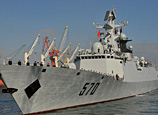
China and Poland established a strategic partnership in 2011, and "our bilateral relationship faces a rare historical opportunity," said Xu Jian, China's ambassador to the country.
"We'd like to encourage provinces and cities to establish a direct contact network," said Kosciukiewicz.
The first China-Poland Regional Forum will convene in the Polish coastal city of Gdansk on April 22. The event is expected to attract more than 150 participants from more than 20 Chinese provinces and municipalities including Beijing, Shanghai and Shenzhen.
"As China urges its companies to go abroad, we should increase our investments in central and eastern European countries, especially Poland," said Li Jianping, vice-president of the Chinese People's Association for Friendship with Foreign Countries. "Enhancing regional or provincial cooperation between the two countries is a practical way to achieve this."
Sun Yuxi, head of the China-Poland Friendship Association and also a former Chinese ambassador to Poland, said that the number of Chinese workers in Poland rose to 30,000 in 2012 from 3,000 in 2010, while more than 20 major companies and 300 small and medium-sized enterprises registered businesses in Poland.
Chinese businesses in Poland are mainly centered on electronics, such as the production of TV sets and monitors, the electro-machinery industry, IT and construction machinery. Major investors include TCL Corp, Digital View, Nuctech, ZTE and Huawei, Kosciukiewicz said.
In February 2012, Guangxi Liu Gong Machinery Co Ltd took over Huta Stalowa Wola, a Polish road machinery maker, for about $100 million, marking China's biggest investment to date in Poland.
In addition, the Chengdu-Lodz direct rail route, connecting the inland metropolis and the central city in Poland, was put into use earlier this year and became the fastest railway freight route between China and Europe.
Kosciukiewicz added that Chinese companies do not yet have enough knowledge about Poland and EU policies.
"Sometimes when they go to Europe, they do business as they do in China. But that's not possible because of different regulations and policies," Chomicki added.

















 WWII TV dramas border on the ridiculous
WWII TV dramas border on the ridiculous


![]()
